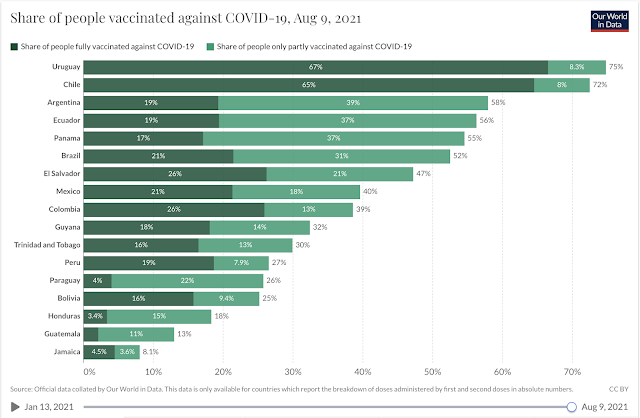The U.S. Biden administration has taken a tough stance on Cuba, continuing the Trump administration's hardline policies and disappointing those who hoped for a return to detente. Cuba experts and American government officials say that Biden’s policy shift reflects the ascendant influence of Sen. Robert Menendez, chairman of the Foreign Relations Committee, reports the New York Times.
But, in other areas, U.S. officials have, verbally, supported multilateral approaches to regional diplomacy. "We must break with the left and right mentality when it comes to promoting democratic values and we should really center on a conversation about democracies in countries that aren't democracies," said National Security Council official Juan González in a press conference following a visit to Argentina and Brazil, yesterday. (Clarín)
The environment could become a positive issue of engagement between the U.S. and other countries in the region: Argentina plans to host a climate change summit as soon as September, in an effort to build a united regional strategy, reports Bloomberg. Chile, Costa Rica and Colombia have signed on as co-organizers of the climate event; Barbados and the Dominican Republic are additional co-organizers, while Mexico plans to participate.
News Briefs
Regional
- Young Latin American leftists are more focused on gender and the rights of minorities than the region's iconic battles of the last century, writes Oliver Stuenkel in Americas Quarterly.
Migration
- Guatemalans are migrating to the U.S. in higher numbers than before, U.S. authorities say they have stopped more than 150,000 Guatemalans at the border this year, four times the number in 2020. Many are pushed by increasingly difficult rural conditions related to climate change, particularly extreme weather, reports the Associated Press.
- Indeed "U.S. and Guatemalan officials, regional experts and civil society leaders say climate-fueled displacement is a likely factor for thousands who’ve decided to strike out from home and head to the U.S.," reports Politico.
Guatemala
- Guatemalan Indigenous and rural unions -- led by CODECA -- blocked roads around the country yesterday, protesting the recent ouster of one of the country's top anti-corruption prosecutors. Demonstrators called on President Alejandro Giammattei and his attorney general, Consuelo Porras, to resign over the case, reports Reuters.
Regional Relations
- The Guatemala situation has put the U.S. in a difficult position, reports Politico: the Biden administration had been putting Guatemala at the center of its policies to tackle the "root causes" of migration. "Now, they need to show their commitment to fighting corruption abroad is more than just talk."
- Peru became the latest country to leave the Lima Group, a sign the region "is moving towards a stage of integration based on respect and solidarity among its peoples," said Bolivian President Luis Arce. (Telesur)
- U.S. national security adviser Jake Sullivan raised concerns about Huawei equipment in Brazil's 5G telecoms network during his visit to the country last week, reports Reuters.
Brazil
- The Brazilian Articulation of Indigenous Peoples of Brazil has asked the International Criminal Court to investigate Brazilian President Jair Bolsonaro for “genocide” and “ecocide”, accusing him of persecuting native peoples and destroying their homelands, reports Al Jazeera.
Haiti
- A controversial Haitian investigative judge -- he was accused of refusing to investigate a corruption complaint against Haiti’s first lady and several government officials -- has been put in charge of the investigation into the murder of President Jovenel Moïse. Judge Mathieu Chanlatte's appointment yesterday caused murmurs in Haitian legal circles, where he is considered a judge of the power in place, reports the Miami Herald.
Cuba
- Cuba's government approved legislation permitting the creation of small and medium enterprises. The major shift in policy comes a month after massive anti-government protests on the island, reports AFP. Cuba's government has accelerated economic reform in recent months, spurred by an economic crisis that stems, in part, from U.S. economic sanctions and the Covid-19 pandemic.
Peru
- Peruvian finance minister Pedro Francke told Reuters that the government can increase mining taxes to fund public spending without affecting private-sector competitiveness, all while reducing the fiscal deficit. (See yesterday's post.)
- Mexican prosecutors still can't say who ordered the mass surveillance of innocent civilians and government critics using Pegasus software, and there have been no arrests or announcements of sackings, despite forensic evidence showing the software had been widely used to target government critics, reports Reuters.
Argentina
- Argentina is now assigning a pension contribution value to the time people have spent raising children. The policy recognizes unpaid care work, and will help women -- who disproportionately provide care for children and work informally -- to retire, reports Al Jazeera.
- Argentina's government mixed geo-political leanings with health policy when it came to purchasing Covid-19 vaccines, with negative results, argues Sylvia Colombo in the New York Times Español.
Vaccines
- Where a selection of countries from the region are with vaccinations, from Our World in Data.


No comments:
Post a Comment